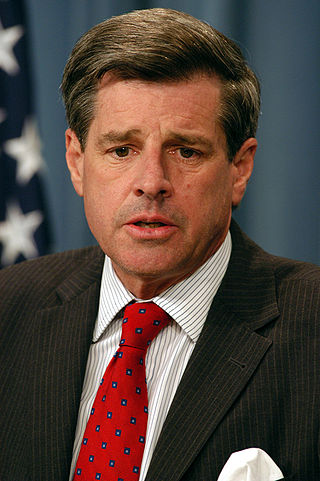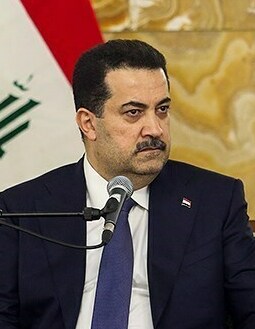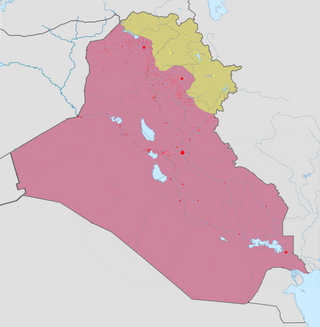
The Coalition Provisional Authority was a transitional government of Iraq established following the invasion of the country on 19 March 2003 by the U.S.-led Multinational Force and the fall of Ba'athist Iraq.

Lewis Paul Bremer III is an American diplomat. He led the Coalition Provisional Authority (CPA) following the 2003 invasion of Iraq by the United States, from May 2003 until June 2004.
In political science and political history, the term power vacuum, also known as a power void, is an analogy between a physical vacuum to the political condition "when someone in a place of power, has lost control of something and no one has replaced them." The situation can occur when a government has no identifiable central power or authority. The physical analogy suggests that in a power vacuum, other forces will tend to "rush in" to fill the vacuum as soon as it is created, perhaps in the form of an armed militia or insurgents, military coup, warlord or dictator. The term is also often used in organized crime when a crime family becomes vulnerable to competition.
The Iraqi Revolutionary Command Council was established after the military coup in 1968, and was the ultimate decision-making body in Iraq before the American-led invasion in 2003. It exercised both executive and legislative authority in the country, with the Chairman and Vice Chairman chosen by a two-thirds majority of the council. The Chairman was also then declared the President of Iraq and he was then allowed to select a Vice President. After Saddam Hussein became President of Iraq in 1979 the council was led by deputy chairman Izzat Ibrahim ad-Douri, deputy Prime Minister Tariq Aziz, and Taha Yassin Ramadan, who had known Saddam since the 1960s.

The Green Zone is the most common name for the International Zone of Baghdad. It was a 10-square-kilometer (3.9 sq mi) area in the Karkh district of central Baghdad, Iraq, that was the governmental center of the Coalition Provisional Authority during the occupation of Iraq after the American-led 2003 invasion and remains the center of the international presence in the city. Its official name beginning under the Iraqi Interim Government was the International Zone, though Green Zone remains the most commonly used term. The contrasting Red Zone refers to parts of Baghdad immediately outside the perimeter, but was also loosely applied to all unsecured areas outside the off-site military posts. Both terms originated as military designations.

The Iraqi Islamic Party is the largest Sunni Islamist political party in Iraq as well as the most prominent member of the Iraqi Accord Front political coalition. It was part of the government of Prime Minister Nouri al-Maliki and is part of the current government of Haider al-Abadi since 2014. Osama Tawfiq al-Tikriti succeeded Vice-President Tariq al-Hashimi as the party's secretary-general on 24 May 2009, who was succeeded in July 2011 by Ayad al-Samarrai.
The Central Criminal Court of Iraq, or CCCI, is a criminal court of Iraq. The CCCI is based on an inquisitorial system and consists of two chambers: an investigative court and a criminal court. The court was created by the Coalition Provisional Authority in 2003 to handle cases involving serious crimes such as governmental corruption, terrorism and organized crime that were previously handled by governorate level judges in the ordinary criminal courts. Candidates for the judiciary had to be an Iraqi national of high moral character and reputation, a non-member of the Ba'ath Party, demonstrate a "high level of legal competence", and sign an oath of office.
In May 2003, following the invasion of Iraq in March of that year, the Central Bank of Iraq-Development Fund for Iraq (DFI) account was created at the U.S. Federal Reserve Bank of New York at the request of the Coalition Provisional Authority (CPA) Administrator. A part of the fund has been transferred to Baghdad and Iraq, and the DFI-Baghdad account was opened at the Central Bank of Iraq "for cash payment requirements". The fund also eventually received money from seized and "vested" Iraqi bank accounts and funds seized by coalition forces. $650 million of this amount belongs to Uday Saddam Hussein, the older son of the former Iraqi president. The DFI have been disbursed mainly for "the wheat purchase program, the currency exchange program, the electricity and oil infrastructure programs, equipment for Iraqis security forces, and for Iraqi civil service salaries and ministry budget operations".
Sectarian violence in Iraq refers to the violence that developed as a result of rising sectarian tensions between the different religious and ethnic groups of Iraq, most notably the conflict between the Shi'i Muslim majority and the Sunni Muslim minority within the country. With the creation of a modern nation-state, sectarian tensions arose slowly and eventually developed into recent violent conflicts such as the War in Iraq (2013–2017) and the Iraqi Civil War (2006–2008).

No End in Sight is a 2007 American documentary film about the American occupation of Iraq. The directorial debut of Academy Award-winning documentary filmmaker Charles Ferguson, it premiered on January 22, 2007, at the Sundance Film Festival and opened in its first two theaters in the United States on July 27, 2007. By December of that year, it had a theatrical gross of $1.4 million. The film was nominated for Best Documentary Feature at the 80th Academy Awards.

The Civilian Police Assistance Training Team or CPATT is a multinational advisory team operating within the US-led coalition in Iraq to rebuild the Iraqi Police.
Coalition Provisional Authority Order Number 2: Dissolution of Entities signed by Coalition Provisional Authority on 23 May 2003, disbanded the Iraqi military, security, and intelligence infrastructure of President Saddam Hussein. It has since become an object of controversy, cited by some critics as the biggest American mistake made in the immediate aftermath of the fall of Saddam Hussein and as one of the main causes of the rise of the Islamic State of Iraq and the Levant (ISIL/ISIS).
The 100 Orders are "binding instructions or directives to the Iraqi people that create penal consequences or have a direct bearing on the way Iraqis are regulated, including changes to Iraqi law" created in early 2004 by Paul Bremer under the Coalition Provisional Authority in Iraq. The orders called for the de-Baathification of Iraq as well as extensive economic changes. Most of the economic changes are focused on transitioning the economy of Iraq from a centrally planned economy to a market economy, as outlined in the contract by BearingPoint:

De-Ba'athification refers to a policy undertaken in Iraq by the Coalition Provisional Authority (CPA) and subsequent Iraqi governments to remove the Ba'ath Party's influence in the new Iraqi political system after the U.S.-led invasion in 2003. It was considered by the CPA to be Iraq's equivalent to Germany's denazification after World War II. It was first outlined in CPA Order 1 which entered into force on 16 May 2003. The order declared that all public sector employees affiliated with the Ba'ath Party were to be removed from their positions and to be banned from any future employment in the public sector.

The Arab Socialist Ba'ath Party, also referred to as the pro-Iraqi Ba'ath movement, is a Ba'athist political party which was headquartered in Baghdad, Iraq until 2003. It is one of two parties which emerged from the 1966 split of the original Ba'ath Party.

The National Vanguard Party, is an illegal political party in Mauritania. It is the Mauritanian regional branch of the Iraqi-led Arab Socialist Ba'ath Party.

The Arab Socialist Ba'ath Party – Iraq Region, officially the Iraqi Regional Branch, is an Iraqi Ba'athist political party founded in 1951 by Fuad al-Rikabi. It was the Iraqi regional branch of the original Ba'ath Party before changing its allegiance to the Iraqi-dominated Ba'ath movement following the 1966 split within the original party. The party was officially banned following the American invasion of Iraq in 2003, but despite this it still continues to function underground.

Mohammed Shia' Sabbar al-Sudani is an Iraqi politician who is serving as the Prime Minister of Iraq since 27 October 2022. He was the Human Rights Minister of Iraq in the Council of Ministers of Prime Minister Nouri al-Maliki from 2010 until October 2014. He was the Governor of Maysan Province between 2009 and 2010.
The Accountability and Justice Act of 2008 is a legislative act passed by the Iraqi Council of Representatives in January 2008.

The Iraqi conflict is an armed conflict that began with the 2003 invasion of Iraq by a United States-led coalition that toppled the government of Saddam Hussein. The conflict continued as an insurgency emerged to oppose the occupying forces and the post-invasion Iraqi government. The United States officially withdrew from the country in 2011 but became reinvolved in 2014 at the head of a new coalition. The main phase of the conflict ended following the defeat of the Islamic State of Iraq and the Levant (ISIL) in the country in 2017, but a low-level ISIL insurgency is ongoing in the rural north parts of the country.








